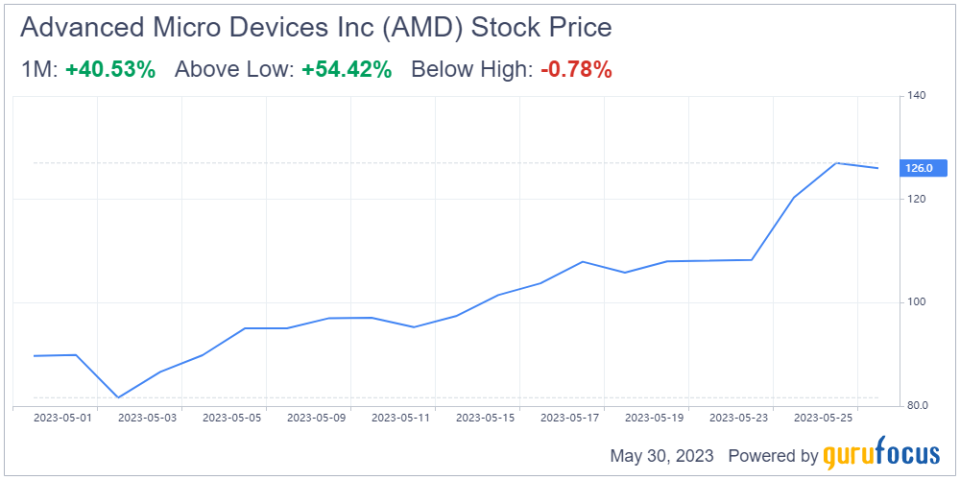Beware of AMD's Rich Valuation, AI Hype
Advanced Micro Devices Inc. (NASDAQ:AMD) has puzzled investors in recent weeks. The company posted first-quarter earnings earlier this month that showed weakness in many areas, yet its shares have risen nearly 42% due to a rally in the semiconductor sector following a very optimistic outlook on artificial intelligence from Nvidia (NASDAQ:NVDA).
Nvidia recently made a projection for sales of $11 billion for the current quarter, an increase of 64% from last year and, most importantly, much higher than the $7.2 billion forecasted by financial analysts. The company said it is increasing the supply to meet the rising demand for its artificial intelligence chips.
Fundamental red flags
There are a few areas of concern for AMD, including poor financial performance, a decline in profitability and a weak outlook
Having already seen a decline in its profitability over the past three consecutive quarters, the company reported a net loss of $139 million for the first quarter of 2023. When a company records less profits over a number of quarters, this is not good news, especially when net profits disappear and give their way to net losses.
Further, revenue declined 9% year over year to $5.35 billion, while the gross profit declined 16% to $2.36 billion and operating income declined 115% to a loss of $145 million. The only financial metric that increased was the GAAP operating expenses, which grew 29% year over year.
Looking ahead to the second quarter, AMD expects revenue to be approximately $5.3 billion, plus or minus $300 million. This estimate shows almost zero growth compared to the first quarter of 2023. Having a weak financial performance for the last quarter and not a lot of growth expected seems a very dangerous path to cross now.
Valuation is at a very steep premium
AMD shares seem to be very pricey now with a forward GAAP price-earnings ratio of 226, forward price-sales ratio of 8.91 and forward price-to-free cash flow ratio of 51.98. The comparison to the Information Technology sector reveals the stock is relatively richly valued as the median values are 24.13, 2.69 and 19.71 respectively.
This significant premium for AMD shares is arguably not justified by the growth slowdown in revenue and mostly by the latest earnings report.
In addition, there are concerns about artificial intelligence hype that make the stock too risky.
A closer look at the artificial intelligence hype
Artificial intelligence has garnered significant hype in recent years, driven by its transformative potential and the rapid advancements in the field. While AI offers numerous benefits and opportunities, it is important to separate the hype from reality. Here are some aspects of the hype to be aware of. I believe that all of these factors can directly affect Advanced Micro Devices and its services.
For instance, artificial intelligence has often been surrounded by exaggerated promises, creating unrealistic expectations. Claims of AI systems being able to solve all problems or achieve superhuman intelligence within a short time frame can lead to disappointment when the actual capabilities of AI systems are understood. What about unclear tested technology and the lack of understanding? Should this general concept prove to be incorrect, then there could be less demand for AMD's chips related to solving artificial intelligence issues.
Next, the term "artificial intelligence" can be broadly used and can encompass various technologies and approaches. This ambiguity can lead to confusion and overgeneralization, with some using the term to describe simple automation tools or basic machine learning algorithms, which may not meet the criteria of true AI. The general public and even some businesses may have a limited understanding of what AI can and cannot do. This knowledge gap can contribute to inflated expectations and the belief that AI is capable of human-like intelligence or flawless decision-making, while in reality, AI systems have specific limitations and require careful design and management. Other notable negative aspects of artificial intelligence include the oversimplification concept, ethical concerns and investment risks. Let us take a closer look at them.
The hype surrounding AI can overshadow critical ethical considerations. While the technology has the potential to bring tremendous benefits, it also raises important ethical questions regarding privacy, bias, job displacement and decision-making accountability. These concerns should be addressed responsibly rather than overlooked. The hype surrounding AI can lead to a rush of investments in related technologies and startups without proper evaluation or understanding of their potential risks and limitations. This can result in wasted resources or investments in projects that may not deliver the expected returns.
In other words, should companies realize that artificial intelligence investments do not provide the expected rate of returns, then will down drastically cut down projects and, as a result, the demand for AMDs chips could drop severely.
Concluding thoughts
Should this artificial intelligence hype worry investors about the prospects of AMD? My outlook is positive, but even if you are optimistic about the AI trend shaping the future of business and society, the valuation of the stock is not attractive and revenue growth seems to have lost its momentum for now.
This article first appeared on GuruFocus.

 Yahoo Finance
Yahoo Finance 
